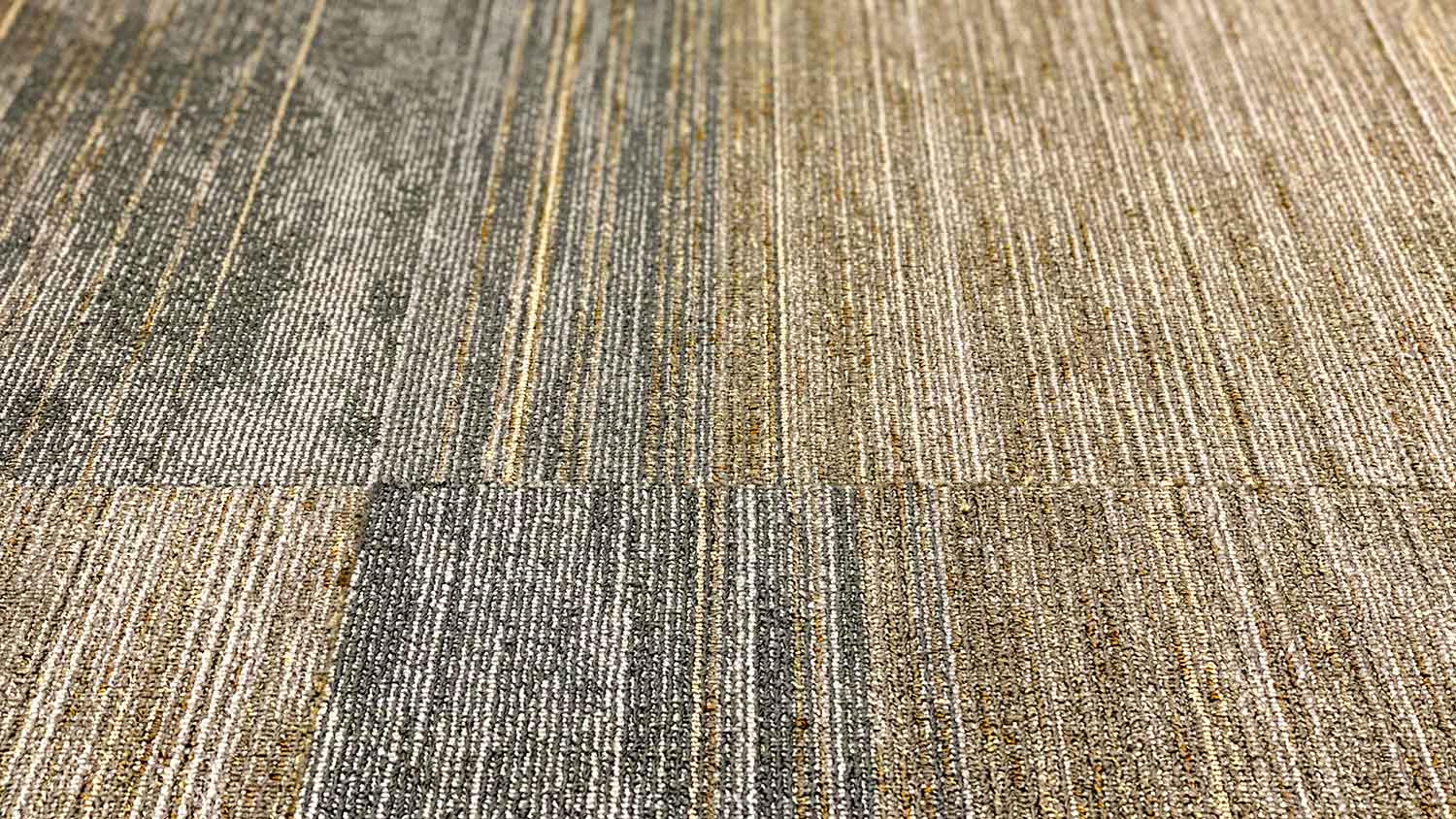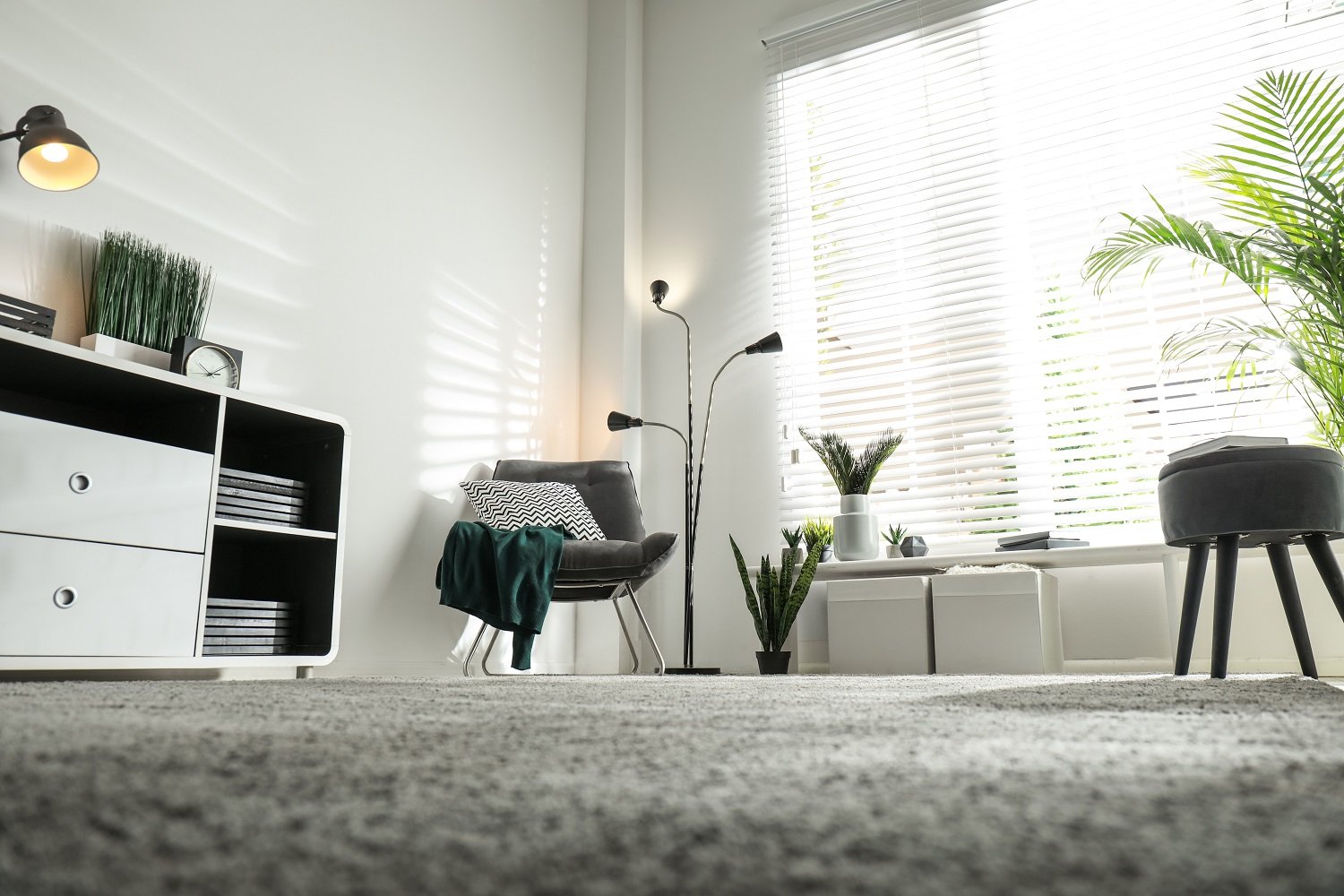4 Types of Carpet Tiles for Your Home
They’re not just ceramic tiles in wigs


Carpet tiles are small, singular versions of wall-to-wall carpeting that were initially designed for commercial use but have grown in popularity among homeowners. Carpet tiles are a popular alternative to traditional broadloom carpet rolls because they’re versatile and less expensive. Plus, they allow you to create fun patterns with different colors and shapes. Here are four different types of carpet tiles you’re most likely to see at carpeting suppliers.
1. Peel and Stick Carpet Tiles

Peel and stick carpet tiles are the most inexpensive type of carpet tiles. As the name implies, each tile has a sheet on the back that can be peeled off and stuck to the surface. Installation doesn't require expensive tools, adhesives, or stretching, so you can DIY it if you want. However, carpet tile installation still takes plenty of time and effort, and you may find that calling a local flooring installer is the best use of your time and money.
| Pros | Cons |
|---|---|
| Easy to DIY | Can’t be used over existing carpet |
| Easy to cut to fit your room | Hard to move in case of improper installation |
| Can be used indoors and outdoors | Pile not as soft as other carpet tiles |
Best for: Living rooms, home offices, and other rooms with a hard flooring surface
2. Interlocking Carpet Tiles
Interlocking carpet tiles, also called snap-together carpet squares, are singular carpet tiles that snap together like LEGO toys. They come in a variety of piles, finishes, and backings. While snapping these carpet tiles together is easy, the seams between each one are tight, so you’ll have to use a little extra elbow grease if you’re DIYing. Loose seams can cause mold and bacterial growth, especially in humid areas. Luckily, it’s easy to toss and replace water-damaged interlocking carpet tiles.
| Pros | Con |
|---|---|
| No tools required for installation | Can be limited in size |
| Versatile | Gets expensive for large rooms |
| Easy to pick up and move | Seams may not be watertight |
Best for: Small rooms and condos and renters who’d like wall-to-wall carpeting but can’t install it
3. Raised Carpet Tiles

Raised carpet tiles are a type of interlocking carpet tile designed to solve the problems that basement carpeting is rife with. Basements harbor moisture and love to invite mold to the party, even when they're finished and well-maintained. You can install raised carpet tiles directly on concrete and other hard surfaces found in basements. They don't require adhesives, and in the event of water damage, they won’t trap moisture. While plusher raised carpet tiles are hitting the market today, the anti-fungal and water-resistant types of carpet fibers used in raised carpet tiles tend to be harder than traditional carpeting.
| Pros | Cons |
|---|---|
| Doesn’t trap moisture | Hard surface |
| Easy to cut and install | Limited colors and sizes available |
| Easily dries out after water spillage | Gets expensive for larger basements |
Best for: Basements, homes in areas susceptible to floods
4. Padded Carpet Tiles
One of the drawbacks of carpet tiles compared to traditional broadloom carpet is that they aren't as soft and plush. Padded carpet tiles strive to be closer to broadloom with a high pile and their own mini carpet pads. Because they often come in peel-and-stick format, padded carpet tiles conveniently don’t require adhesives or installation.
| Pros | Cons |
|---|---|
| Less expensive than wall-to-wall carpet | Expensive for large rooms |
| Similar plushness to traditional broadloom | Hard to find |
| Easy to install | Can’t install over existing carpet |
Best for: Bedrooms, living rooms, and other indoor areas where people often walk barefoot
How Much Does It Cost to Install Carpet Tile?
The cost to install carpet tile can range between $540 to $2,380, with the average being around $920. Several factors contribute to this cost, including:
Size of the carpeted area
Material
Removal and disposal of your existing flooring
Preparation of the subflooring
Labor
There are plenty of ways to save on costs if you don’t mind putting in a bit of work yourself.
DIY vs. Hiring a Pro
Installing carpet tiles is actually a fairly simple DIY that only requires a few specialized materials. The average labor cost for professional carpet tile installation is $0.50 to $1 per square foot, so depending on the area you’re installing carpet tiles in, it could be worth the extra time.
However, hire a local carpet installer if you need to lay subflooring, replace existing carpets, or complete flooring repairs. If done incorrectly, DIYing these tasks could lead to greater issues down the road. Leave the tricky stuff to the pros and install the carpet tiles yourself when it’s ready to go. That way, you save on costs and rest assured you have stable floors for years to come.
Frequently Asked Questions
Carpet tiles are less expensive than traditional carpet. The average cost of carpet installation is $1,800, or $3 to $11 per square foot. In comparison, carpet tiles cost $2.50 to $11 apiece and can often be bought in bulk cartons. Since you can more easily DIY carpet tiles, you may be able to save on installation costs, too.
Carpet tiles can last 10 to 20 years, depending on factors like materials, foot traffic, humidity, and maintenance. Homes with high foot traffic will wear down carpet tiles sooner than homes with low foot traffic. They can be cleaned similarly to traditional carpet, and they even offer more options for thorough maintenance since they can be picked up and moved for deep cleaning.
Carpet tiles don't require a carpet pad or other underlay. They have their own underlay attached, although padded carpet tiles are the comfiest option for residential users since their underlay is the closest to traditional carpet padding. Acoustic underlay is only necessary in commercial spaces or large households if upstairs noise is an issue. Otherwise, carpet tiles don't need anything underneath them prior to installation.





- Carpet Tiles vs. Carpet: Which One Will Floor You?
- How Long Does Carpet Last? 7 Signs You Need to Replace It
- How to Disinfect Carpet: Facts, Myths, and What You Can Do Yourself
- Who Should You Hire to Install Carpeting?
- What Is the Best Carpet for Stairs and How Do You Choose One?
- How to Prepare Your Home for a New Carpet Installation
- What to Use to Clean Carpets Like a Pro
- Protect Yourself from These Common Carpet Scams
- Everything You Need to Know About Carpet Padding, From Cost to Benefits
- How to Get Stubborn Stains Out of Your Carpet










